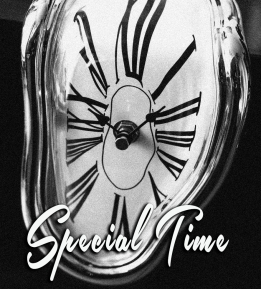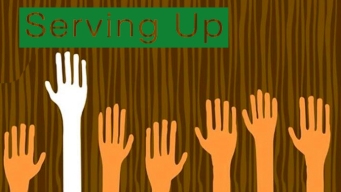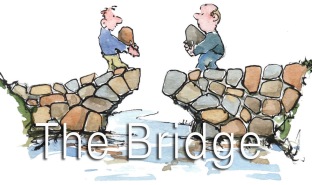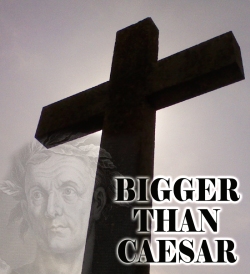 An engineer supervising the construction of a farm-to-market road explained to one of the villagers the advantages that would come with the project. To illustrate his point, he asked this question: “How long does it take you to carry your produce to the market by push cart?” “Three days, sir,” was the answer. “With the new road,” said the engineer, “you will be able to take your produce to the market then go back home on the same day.” “Very good, sir, I’m elated to know that,” the villager agreed courteously. “But, sir, what shall I do with the two days?”
An engineer supervising the construction of a farm-to-market road explained to one of the villagers the advantages that would come with the project. To illustrate his point, he asked this question: “How long does it take you to carry your produce to the market by push cart?” “Three days, sir,” was the answer. “With the new road,” said the engineer, “you will be able to take your produce to the market then go back home on the same day.” “Very good, sir, I’m elated to know that,” the villager agreed courteously. “But, sir, what shall I do with the two days?”
What do we do indeed with our “extra” days? How do we make use of our “spare” time? The road to God has already been paved for us. Unlike in the days of our ancestors before God became one of us, we now no longer have to do so many wanderings to discern our way to Him. By His Incarnation, God has come to us. And so what used to be a longer route to being with Him and knowing Him has become a short journey for us. The Sacraments have assured us of this. The written Book of Life is now an easy reach. The Church has been founded so, among other things, we could be one and be together in worship and service. All this saves us time. But saving time for what?
Kiswahili speakers in Kenya are fond of saying “Haraka, haraka haina baraka” (haste has no blessing). It is akin to the dictum “haste makes wastes.” Some would comment that it is a laid back approach to life, and has no significance in a rat-race and cut-throat society where time is money and money is everything. In the so-called modern lifestyle, there is no spare time, because every second counts. Depending on how much money a person wants to earn, time is used to generate the desired amount of wealth. Time has been monetized, and because life is basically about time, it too has been monetized.
How do we value our life? What premium do we attach to it? In some sectors of the society, life has been quantified based on a person’s profession, skills, age, and even gender. Thus, the financial compensation for killing a doctor, for example, is higher than that of, say, a farmer. When time is monetized, people are objectified, and life itself is trivialized.
We are now in the season of Advent, and, moving to another liturgical year, we are preparing for Christmas, which marks the birth of our Lord Jesus Christ. This Sunday’s readings talk about watchfulness, because “you do not know when the Lord of the house is coming” (Mk 13:35). Of course, we do know, that is, if we refer to Christmas as the day of the Lord’s coming. But when by the Lord’s coming we mean the ‘end of time’ or, more personally, the end of our earthly life, then we do not know.
But many things in life are known. The arrival of Christmas season is already known. Events like anniversaries, graduations, and the likes are oftentimes known in advance. Hence, when there is an intention to mark or celebrate them, we make a plan to prepare for them. The unknowns, however, are plenty and potentially catastrophic when not prepared for.
A hospital visitor said to a friend: “Am I right in presuming that it was your passion for drinking that brought you here in the hospital?” The friend replied: “I don’t think you know this place. It’s the last place on earth I’d come to if I was looking for a drink.”
Our passion for things has taken us places. Our ambitions, too, have pushed us to work harder and for longer hours and days. Whatever we are preoccupied with, it has occupied us first. In the same vein, the manner with which we prepare for Christmas determines the kind of Christmas we get.
We all got 24 hours each day. How we make use of our time is really up to us. While some of us live longer than others, in essence, every day on earth is a singular day, and every second is an important part of life. Viewed this way, Advent becomes a special time if we spend it fruitfully and meaningfully with others and with God.
 A young lady was once asked how she acquired such fine dancing skills without the benefit of a professional training. She replied by saying: “I grew up with five brothers. Those were moments of grace for me because with them I learned how to dance — that is, while waiting for my turn to use the toilet.”
A young lady was once asked how she acquired such fine dancing skills without the benefit of a professional training. She replied by saying: “I grew up with five brothers. Those were moments of grace for me because with them I learned how to dance — that is, while waiting for my turn to use the toilet.” A policeman was giving a group of elementary school pupils a lecture on safety and public discipline when he was interrupted by a six-year-old girl. She looked up and down at his uniform and asked, “Are you a policeman?” “Yes, I am,” the officer said. “My mother told me that if I ever needed help I should ask a policeman. Is that right?” the girl asked. “Yes it is,” said the policeman. The girl extended her foot to the policeman and said, “OK, then, would you tie my shoe?”
A policeman was giving a group of elementary school pupils a lecture on safety and public discipline when he was interrupted by a six-year-old girl. She looked up and down at his uniform and asked, “Are you a policeman?” “Yes, I am,” the officer said. “My mother told me that if I ever needed help I should ask a policeman. Is that right?” the girl asked. “Yes it is,” said the policeman. The girl extended her foot to the policeman and said, “OK, then, would you tie my shoe?” Two people decided to go for a three-day camping. One went with luggage full of supplies and personal effects that could last for days; the other barely packed anything for a day’s provision. They hiked for hours and trekked a mountain until, exhausted, they decided to put down their gears, unpack, and settle for the night. The area they picked as camping site was ideal—a clearing, water source, and safe. Time to pitch the tent, therefore. The well provisioned one had everything from food and drinks to sophisticated gadget, but no tent. The other had a meager supply of bare necessities including a tent. The night went by with the first camper suffering in the cold and left exposed to the nocturnal elements; the other, although feeling concerned for his companion but helpless as his tent could only accommodate one person, had a comfortable sleep. Second day came, both campers decided to abort their journey and return to base.
Two people decided to go for a three-day camping. One went with luggage full of supplies and personal effects that could last for days; the other barely packed anything for a day’s provision. They hiked for hours and trekked a mountain until, exhausted, they decided to put down their gears, unpack, and settle for the night. The area they picked as camping site was ideal—a clearing, water source, and safe. Time to pitch the tent, therefore. The well provisioned one had everything from food and drinks to sophisticated gadget, but no tent. The other had a meager supply of bare necessities including a tent. The night went by with the first camper suffering in the cold and left exposed to the nocturnal elements; the other, although feeling concerned for his companion but helpless as his tent could only accommodate one person, had a comfortable sleep. Second day came, both campers decided to abort their journey and return to base. A post office worker opened a letter addressed to God, which read: “Dear God, I am an 83-year old widow living on a very small pension. Yesterday someone stole my purse. It had a US$100 in it which was all the money I had until my next pension check. Next Sunday my last two friends are coming over for dinner. No family to turn to, that money was my sole recourse.” The postal worker was touched, and went around showing the letter to his colleagues, who all dug into their wallets. In total, US$96 was collected, which was then sent over to the widow. The rest of the day, all the workers felt a warm glow thinking of the nice thing they had done. A few days later, another letter from widow came. This time it read: “Dear God, thanks so much for your kindness. Because of you, I was able to fix a lovely dinner for my friends. By the way, there was 4 dollars missing. No doubt, those thieving bastards at the post office stole again.”
A post office worker opened a letter addressed to God, which read: “Dear God, I am an 83-year old widow living on a very small pension. Yesterday someone stole my purse. It had a US$100 in it which was all the money I had until my next pension check. Next Sunday my last two friends are coming over for dinner. No family to turn to, that money was my sole recourse.” The postal worker was touched, and went around showing the letter to his colleagues, who all dug into their wallets. In total, US$96 was collected, which was then sent over to the widow. The rest of the day, all the workers felt a warm glow thinking of the nice thing they had done. A few days later, another letter from widow came. This time it read: “Dear God, thanks so much for your kindness. Because of you, I was able to fix a lovely dinner for my friends. By the way, there was 4 dollars missing. No doubt, those thieving bastards at the post office stole again.” Once upon a time two brothers, who lived on adjoining farms, fell into conflict. It was their first serious rift in 40 years of farming together. It began with a small misunderstanding, which exploded into an exchange of bitter words followed by weeks of silence. One day, the older brother hired a carpenter to build a tall fence in the middle of a wide canal which was contracted by his younger brother and was designed to split their farms. The carpenter nodded and started working. After some time, the older brother went to see the carpenter and the progress of his work. The farmer’s eyes opened wide and his jaw dropped. There was no fence at all, but a footbridge. On the other side of it, there was the younger brother approaching, crossing the bridge. Eventually, the two brothers met in the middle of the bridge and hugged each other.
Once upon a time two brothers, who lived on adjoining farms, fell into conflict. It was their first serious rift in 40 years of farming together. It began with a small misunderstanding, which exploded into an exchange of bitter words followed by weeks of silence. One day, the older brother hired a carpenter to build a tall fence in the middle of a wide canal which was contracted by his younger brother and was designed to split their farms. The carpenter nodded and started working. After some time, the older brother went to see the carpenter and the progress of his work. The farmer’s eyes opened wide and his jaw dropped. There was no fence at all, but a footbridge. On the other side of it, there was the younger brother approaching, crossing the bridge. Eventually, the two brothers met in the middle of the bridge and hugged each other.
 A story is told of a father who was impressed by his son’s ability to draw a large crowd to his public lecture. He asked him how he did it and the son replied: “Oh it’s like this, father. Three groups comprised the audience. First group was made up of my students who came to listen to my lecture as part of their course requirement. The second were those who showed up because they want to be with the students, and the third were security officers sent by the students’ parents.”
A story is told of a father who was impressed by his son’s ability to draw a large crowd to his public lecture. He asked him how he did it and the son replied: “Oh it’s like this, father. Three groups comprised the audience. First group was made up of my students who came to listen to my lecture as part of their course requirement. The second were those who showed up because they want to be with the students, and the third were security officers sent by the students’ parents.”
